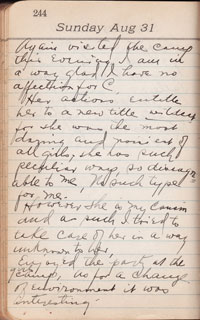
Shapiro called me
up last night and today
we went together to Spring
Valley.
C. helped us to find
quarters, at night visited
the girls camp.
————-
Shapiro is a familiar character in Papa’s diary, a good friend and B’nai Zion brother who turns up a lot at parties and gatherings. I figure he and Papa met for Saturday morning services on the Lower East Side, stopped by their apartments to pick up some things for the weekend, and then took subway to Grand Central and caught the train to Spring Valley.
I have a photo of Coney Island from the 1920’s in which men walk the boardwalk at the height of summer in jackets, ties and hats, and I assume Papa dressed similarly. Did he and Shapiro also dress this way as they went north? Did they share the train with lots of other similarly-dressed Jews, all heading to join their friends at camps or bungalow colonies in the country? Did they fill the air inside the cars with smoke and hopeful chatter about their prospects for the long weekend? And, when they arrived in Spring Valley, did they finally loosen their ties and drape their jackets over their forearms as they dispersed? Did they walk miles to their camps, hop on buses, pile into cars if they were lucky enough to have friends who drove?
It’s been a little harder than I expected to get my questions about Spring Valley camps answered, but they keep piling up. What kind of “quarters” did Clara secure for Papa and Shapiro? A couple of cots in a bungalow shared with a dozen others? A motel room? A canvas tent? When they visited the “girls camp” in the evening, what exactly went on? Did they sit around a campfire and sing socialist songs? Did the trees and the crickets, the smell of smoke in the cool August air remind Papa of the European foothills he left behind, trigger long reminiscences of the old country? Did men and women inch closer, some of them slipping off in pairs, away from the firelight, to provide fuel for the next morning’s gossip?
And what of Papa and Clara II? He had vowed not to pursue her any further, knew she used him for flattery and favors but would likely leave his romantic desires unfulfilled. Yet still, he came to Spring Valley to see her. Perhaps his forgiving nature led him to hope she would not disappoint him, would not be true to form. Perhaps he knew it was foolish to entertain such hopes. Perhaps, to sit and watch her face by firelight, to see her flirt and laugh and tuck her hair behind her ear and know he could never have her gave shape to the feeling of “great longing” he lived with and had written of, a feeling he could not yet imagine a life without, a feeling that somehow fed his romantic soul’s hunger for unfulfilled desire, his poet’s love of pathos.
I do not know exactly what Spring Valley was like, but I do know Papa did not simply sit and sing and clap and laugh along with his friend Shapiro and think of nothing else. For all the synagogues and packed subway cars and noisy trains and cramped country quarters and parties in the woods he saw that day, I know he felt alone.
————-
Update:
Additional Note:
Fred, the CRRO (Chief Railroad Research Officer) for Papa’s Diary Project, tells us how Papa would have gotten to Spring Valley from the City: He would have walked across the Hudson Terminal at Chambers street to the Hudson Tubes, where he would have grabbed the old H&M to Jersey City. From there, he would have taken the Erie Railroad to Spring Valley. His return trip presumably traced the same path in reverse.



